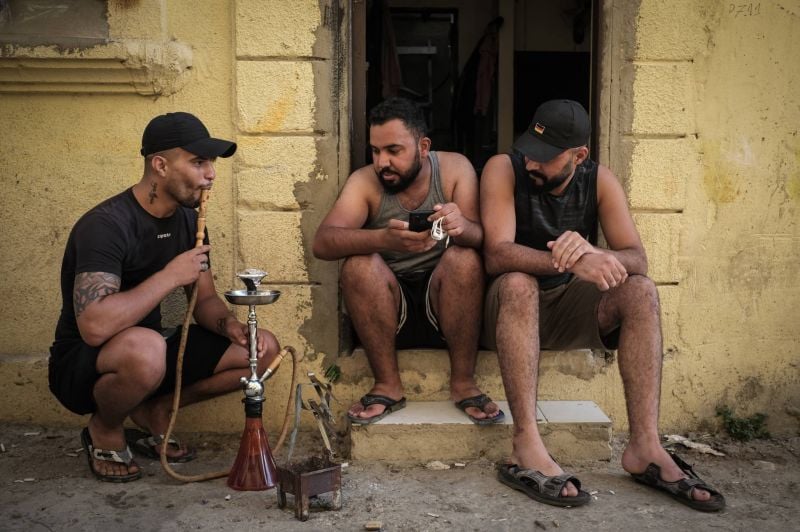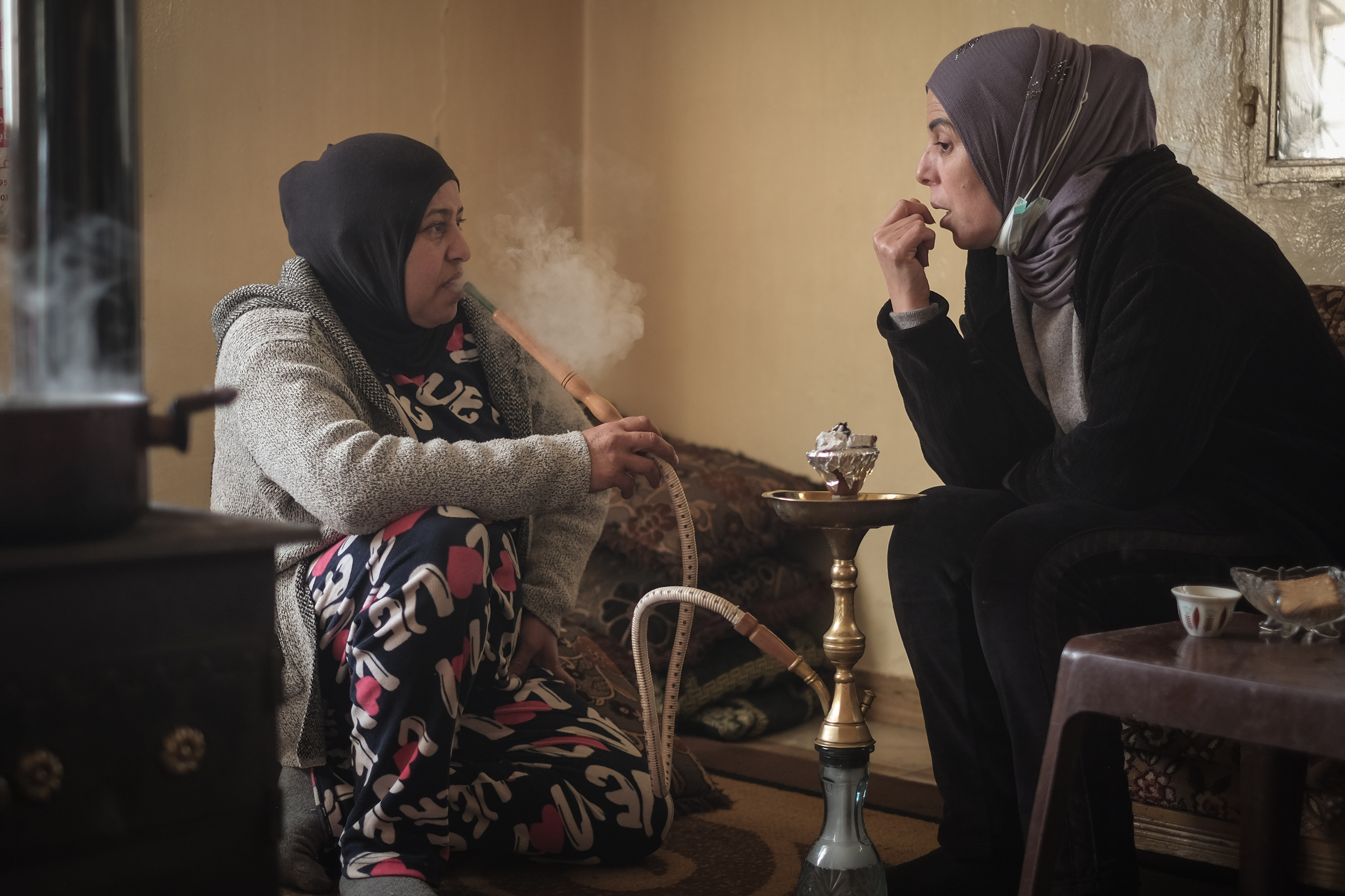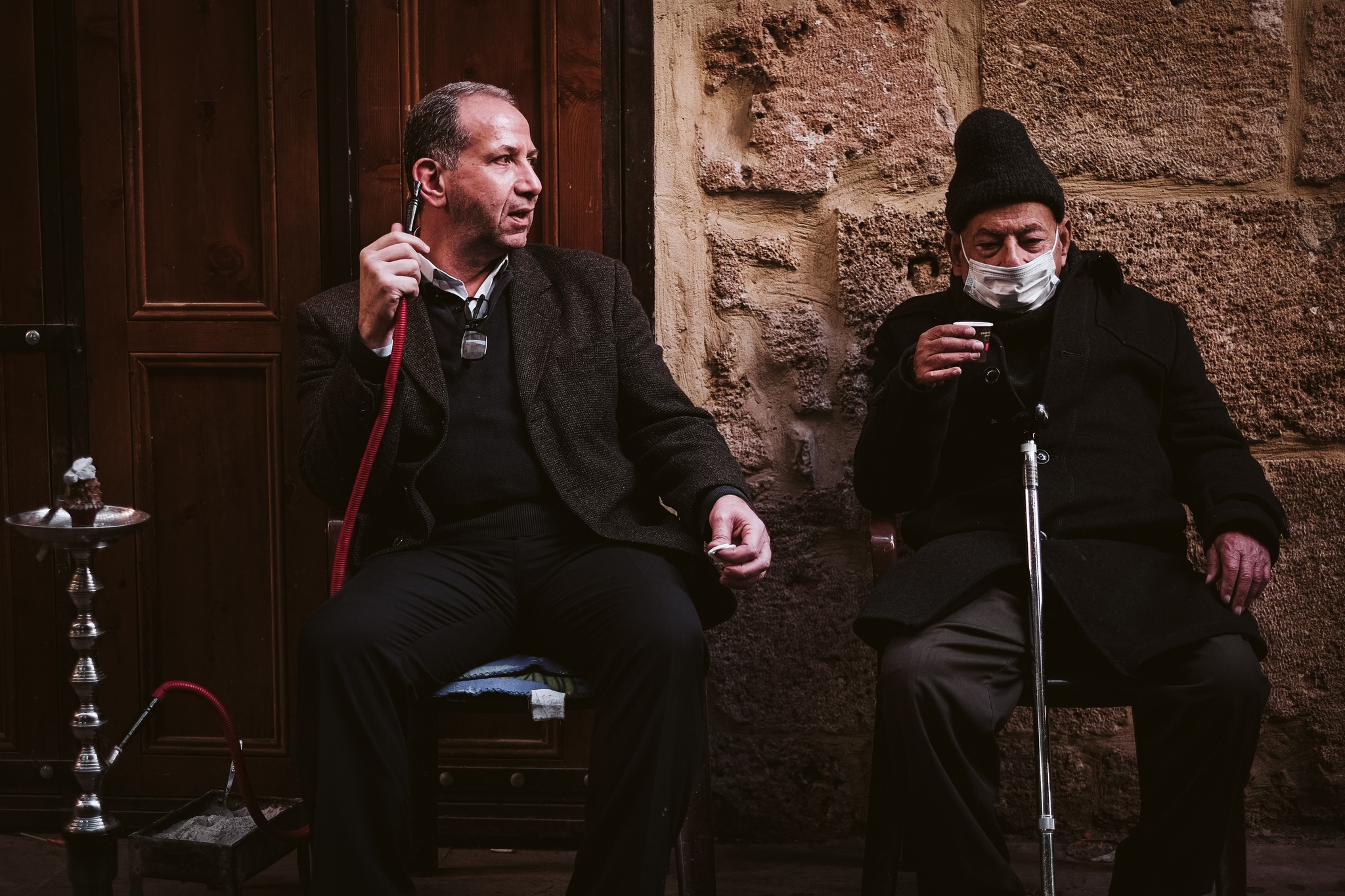
Three Syrian men share a shisha in front of their house in Karantina, Beirut, on Aug. 19, 2021. (Credit: João Sousa/L'Orient Today)
BEIRUT — The sweet smell of apples wafts through the air as one walks by a small local shisha cafe in the city.
If you live in Lebanon, you probably know this cafe. There is one at every corner, and in every neighborhood.
There are always a couple of young men sitting outside on the sidewalk, or inside laughing, sipping sweet tea, or watching a football match on a small screen.
The shisha, a water pipe used to smoke flavored tobacco, is a staple Lebanese habit. Some would even call it a culture.
The most popular flavors in Lebanon, widely available in almost every shisha cafe, are apple, rose and grape, though mint is also common.
Among the more exotic flavors are watermelon, licorice, strawberry, candy and even chocolate.
More traditional menus will also include one or two plain tobacco shishas without added flavors, usually smoked by the older generation.
Shisha’s origins are unclear. Many countries, including as India, Iran, Turkey, Egypt and Syria, claim that it originated in their territories.
It is likely that shisha popped up in various places at the same time, however, it notably became popular in Africa and the Arab World in the 16th century, when the Portuguese introduced tobacco to Iran and coffee shops started spreading in the region.
Shishas, once deemed a diplomatic gift — French luxury manufacturers such as Baccarat, Christofle and Saint Louis produced them until 1914 — are now used by a large portion of Lebanese youth, despite the health risks associated with them, to kill time amid a deteriorating economy and a difficult times.
Two young men leisurely smoking shisha by the sea. Beirut, June 28, 2020 (Credit: João Sousa/L'Orient Today)
'Cheaper than therapy'
Speaking from one of the cafes scattered across the southern suburbs of Beirut, Rida Daoud, a 29-year-old civil engineering graduate, told L’Orient Today he “smokes [shisha] because I want to forget about the hard times and not worry.”
“To me, it’s a cheap relaxation technique,” he adds. “It’s cheaper than therapy.”
A waiter brings Daoud a shisha, places three coals on top of the perforated foil and takes several long draws from pipe to get it started, before handing it to him.
Despite his degree, Daoud has never found work as an engineer.
“I worked as a driver for a pharmaceutical company, as a security guard at a restaurant and now I’m in between jobs,” he said, admitting that he takes around $170 from his parents per month and spends it on shisha, sweet tea and transportation.
He comes to the cafe twice a day — once by himself while his friends are still at work to kill time, and again with his friends later in the evening.
“I think I’m waiting for a miracle,” Daoud said.
A recent study by Lebanese economist Bassam Hamdar showed that unemployment among Lebanese youth exceeded 60 percent in 2020, though official figures show a lower number. “Over 30,000 Lebanese university students graduate [yearly], but the job market in Lebanon only requires between 3,500 and 4,000 graduates [per year], so we have a surplus,” Hamdar told L’Orient Today in October.
Ali Majed, 30, is a business management graduate who lost his accounting job two years ago when the company he was working at closed due to the crisis.
“[My] wife lives in Germany, and I submitted my documents to get a visa to join her a year and half ago,” Majed told L’Orient Today from the same cafe. “According to my lawyer, I still need to wait for another six months to get it, so I spend my time here.”
“I pay LL60,000 for a small shisha [around $0.6 at the parallel market exchange rate] and LL50,000 for a cup of sweet tea. I can’t afford to be wasting money right before my trip abroad,” he added.
A bigger shisha with more tobacco costs LL300,000 and lasts around three hours.
According to the Arab Youth Survey conducted in 2020, more than 54 percent of young Lebanese wish to leave their country, alongside 54 percent of their contemporaries in war-stricken Syria and 58 percent of young Palestinians living under Israeli occupation.
Hany Abed says he is leaving for Dubai on May 4. “After sitting for two years on this chair with my laptop, and shisha in hand impatiently applying for jobs abroad, I got lucky,” he says.
However, he won’t be abandoning the shisha when he leaves; “it has been my most loyal companion,” he says.
Killing time, feeling ‘helpless’
Hussein Hamieh, owner of a local shisha store in the southern suburbs of Beirut told L’Orient Today that, despite the crisis, his business is flourishing.
“Such cafes are mostly for men to sit in, but I have almost double the number of customers who are women and who get their shisha delivered to their door,” he says.
 Two ladies catch up over shisha. Faour, Bekaa Valley, on Jan. 25, 2023 (Credit: João Sousa/L'Orient Today)
Two ladies catch up over shisha. Faour, Bekaa Valley, on Jan. 25, 2023 (Credit: João Sousa/L'Orient Today)
Hamieh slaps his hand against the shoulder of a young man in his early 20s sitting on a motorcycle outside the cafe.
“Sami here delivers it on his motorcycle, but only within a distance of four or five streets away from my shop,” he explains.
Hamieh notes that he won’t be able to cover the costs of a longer ride and would then have to charge more for delivery.
“In that case people won’t order anymore, or I would be known as the shop that ‘is too expensive’ and people would boycott me,” he says with a laugh.
Amal Haddad, who lives in Ain al-Rummaneh, just one street away from Hamieh’s shop, told L’Orient Today that she tried several shisha shops before settling on Hamieh’s.
“Every day when I send my kids to school in the morning, I text Hussein on WhatsApp and tell him to send me an apple shisha. I sit on the balcony for three hours smoking and looking at people passing by,” she concedes.
Haddad’s husband died five years ago, leaving her to tend to her three children alone. She lives on money sent by her brother, who is a mechanical engineer in France.
“I wouldn’t know how else to spend my morning if I weren’t smoking my shisha,” Haddad says.
“Smoking is bad, but trust me,” she continues, “loneliness is way, way worse.”
Another of Hamieh’s regulars, 36-year-old children’s books illustrator Rania Sibai, says she smokes shisha while working from home.
“If you call it ‘working’ to begin with. I work for around one hour per day only,” she explains, noting that she is not working on as many projects as she used to.
“Around five years ago, I would barely have time to have my breakfast while working because I was working on several projects at once,” Sibai adds. “Right now I feel helpless, I try to smoke away the blues and feel grateful for the small projects I’m working on, regardless of the fact that they don’t make ends meet.”
‘A coping mechanism’
In Lebanon, a country that often finds itself amid conflict and insecurity, many youths turn to coping mechanisms that provide a short escape from the harsh realities of their everyday lives. Sociologist Daniella Hourani told L’Orient Today that, although there are no accurate figures for the number of Lebanese shisha consumers, she believes the majority of consumers use it as “a coping mechanism.”
“The crisis, as bad as it is, is not entirely new to the Lebanese. Most of the population has witnessed war and poverty in the past, so I believe that the shisha is often used in Lebanon as a way for people to get their mind off things,” said Hourani.
 Even during Covid times, some civilians still maintained the habit of socialising by having shisha and coffee with one another. Tripoli, Jan. 9 2021 (Credit: João Sousa/L'Orient Today)Even during Covid times, some civilians still maintained the habit of socialising by having shisha and coffee with one another. Tripoli, Jan. 9 2021 (Credit: João Sousa/L'Orient Today)
Even during Covid times, some civilians still maintained the habit of socialising by having shisha and coffee with one another. Tripoli, Jan. 9 2021 (Credit: João Sousa/L'Orient Today)Even during Covid times, some civilians still maintained the habit of socialising by having shisha and coffee with one another. Tripoli, Jan. 9 2021 (Credit: João Sousa/L'Orient Today)
“It’s become like a form of toxic group therapy, where people come together sometimes to complain about the hard times and at other times to pretend like they don’t exist,” she added.
Hourani notes that the communal way that groups of young men sit together and talk could be a way for “them to de-stress."
"It’s not ideal but it is what it is.”